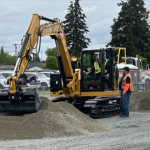In this together: Addressing mental health in construction
 Call it a perfect storm of factors: Intense workloads, tight deadlines, long hours, supply chain challenges, financial concerns, and isolation are putting a great deal of stress and strain on workers in the construction industry. And to make matters worse, this profession traditionally doesn’t really offer a safe space for sharing feelings. That means such internal struggles often go unresolved and unaddressed.
Call it a perfect storm of factors: Intense workloads, tight deadlines, long hours, supply chain challenges, financial concerns, and isolation are putting a great deal of stress and strain on workers in the construction industry. And to make matters worse, this profession traditionally doesn’t really offer a safe space for sharing feelings. That means such internal struggles often go unresolved and unaddressed.
We don’t have to tell you that the COVID-19 pandemic has taken a toll on mental health. According to research from December 2020, more than 50% of adults surveyed shared that worry or stress related to the pandemic had a negative impact on their mental health. Now for the good news? Employers can make a positive difference through early intervention and in providing necessary resources in times of strife.
Here’s a look at what that means:
Early intervention
With construction workers often spending time away from home, the early signs of mental distress are often overlooked. If left unchecked, mental health challenges may later present as physical ailments. And to make matters worse, physical injuries can themselves lead to mental illness, underscoring the importance of noticing the early signs of mental stress.
The role of employers
Employers in the construction industry have a role to play in addressing mental stress and providing solutions. That means putting a focus on improving working conditions and providing access to health and safety resources. Here are a few ways to do just that:
1. Recognize the challenge and provide information
Accepting that there may be a problem is a critical first step in getting better. Considering the rates of suicide among workers in the construction industry, organizations should empower their leaders to identify early signs of mental health conditions. Managers can — and should — play their part by monitoring behavior and pointing them in the right direction for help if it’s warranted.
Employers can take action by offering general training on managing stress. For example, such programs might educate personnel on how exercise can be employed as a coping mechanism. Training modules might touch on the importance of a sound work-life balance, cognitive skills to help employees to recognize toxic thought patterns, and reinforce emotional intelligence skills. Employers should provide managers and supervisors with further training to help them develop emotional intelligence, identify early signs of mental health problems, and learn to listen to employees who might need an outlet.
2. Facilitate access to resources
Employee assistance programs can hold promise in that they can help workers get to the other side of mental health challenges. These programs, typically purchased through a vendor, can connect employees with the right professional and may be available on demand.
Some workers might not feel comfortable talking to a person and would prefer less of a commitment. The answer might be apps geared toward meditation and mindfulness — to help with stress management. Whatever approach, it matters more that you’re making an effort to reach people in their darkest hours.
Intervention programs are critical to addressing the mental health crisis in the near term. In the long term, however, construction companies need to effect a cultural change that does away with incidents of bullying and harassment at building sites and helps remove the stigma associated with masculinity and mental health challenges.








